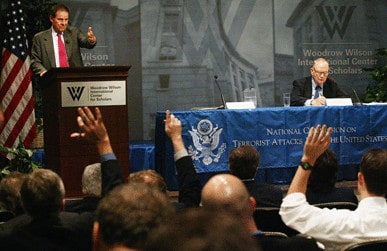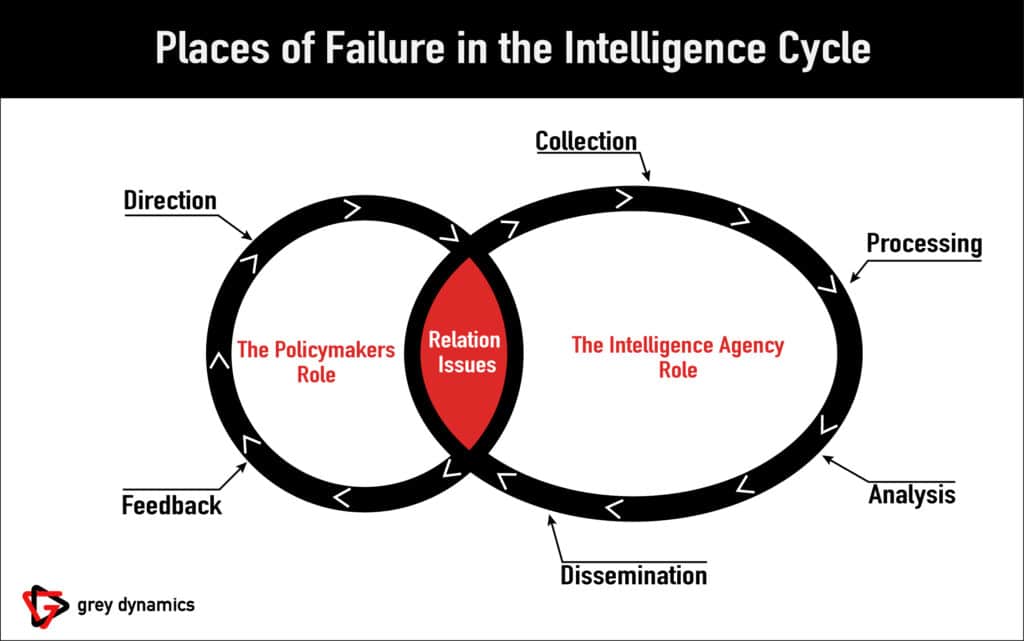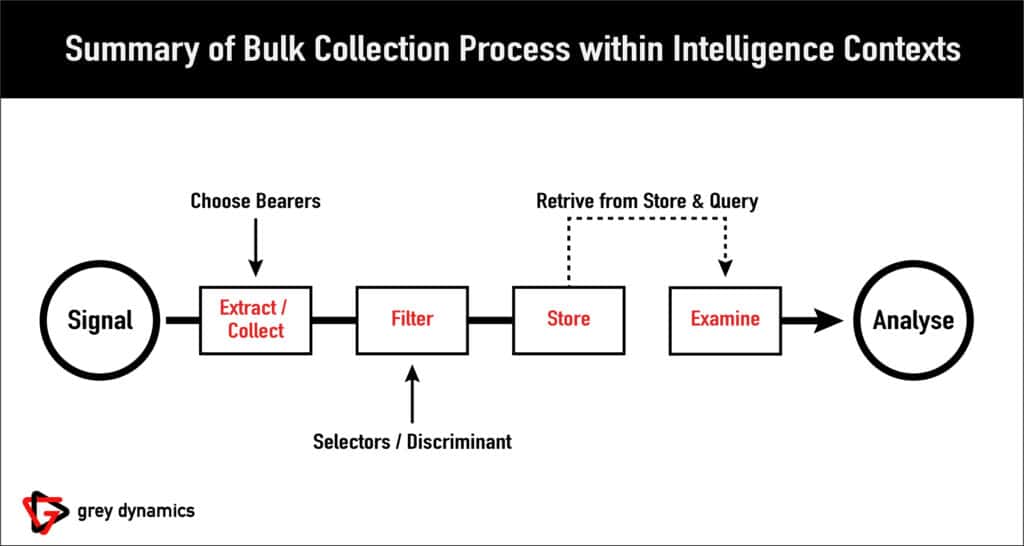Intelligence Failure can be defined as when an actor does not collect and analyse information adequately, formulate sound policy based on intelligence (and other considerations), or respond effectively. This implies that Intelligence Failure can happen at multiple levels at multiple stages during the entire Intelligence Cycle.
Intelligence Failure is quick to make national headline news due to the devastating impact it can have. The public and media alike are keen to hold the Intelligence community and policymakers accountable when Intelligence does not function as anticipated. Conversely, Intelligence Successes often go unpublicised, which is a symptom of their success.
Defining ‘Intelligence Failure’ is more challenging than perhaps initially evident. Modern media frequently uses the term across a wide range of events. The phrase immediately evokes images of the 11th September 2001 attacks, or the 2017 London Bridge attacks, as incredibly famous examples of a lack of warning of significant events. However, Intelligence Failure can occur in more than one way.
1.0. So What?
The function of Intelligence is for the IC to provide as much actional information as possible to decision-makers. The objective is to inform their decisions. Any Intelligence Failure will hinder this decision-making process. Therefore, Intelligence Failures have negative strategic consequences. These may be not negating enemy attacks or causing a strategic disadvantage against an opponent.
It is essential to understand how and why Intelligence fails to try and improve the Intelligence process. In turn, analysis of failure can prevent errors from repeating and increase the likelihood of strategic success in the future.

2.0 When Can Intelligence Failure Happen?
2.1.The Intelligence Cycle
The Intelligence Cycle is a framework for understanding how Intelligence works in practice. Whilst there is debate about the specific stages and the complexity of the networks involved, there is general agreement that the Intelligence Cycle is comprised of the following stages:
- Direction: Deciding the focus and requirements of the Intelligence product.
- Collection: The collection of raw information.
- Processing: The processing phase includes collation, decryption, and interpretation of raw collected information.
- Analysis: “Converting new information into something meaningful which includes implications and assessments of the collected data“
- Dissemination: The distribution of the Intelligence product to the consumer.
As these are all stages of the Intelligence Cycle, each step is innately open to Intelligence failure.
3.0. How Does Intelligence Failure Happen?
3.1. Direction
Intelligence Failure can occur at the direction stage of the Intelligence Cycle due to a lack of effective communication between the Intelligence consumers and producers. Intelligence consumers must make their requirements clear. However, they may lack clarity in their request or lack an understanding of the capabilities of the Intelligence producers. Conversely, the producers may misunderstand the consumer’s aims or deviate from these aims throughout the Intelligence process.
Intelligence consumers are generally looking for up-to-date information regarding their current issues and strategic priorities. Therefore, as part of the direction, consumers may be requesting short-term Intelligence products which lack significant strategic value and are only relevant for a short time.
3.2. Collection
The method of data collection of information that may eventually become Intelligence varies significantly depending on the collection method. However, this stage is innately open to Intelligence Failure through the collection of incorrect or irrelevant information.
Some Intelligence scholars consider the filtering of information as part of the Collection phase, as relevant information must be chosen selectively from the large volume of raw data. Therefore, due to such a large signal-to-noise ratio, it is likely that some critical information is filtered out before analysis, or essential information is disregarded as a result of confirmation bias.
3.3. Processing
There are multiple points at which Intelligence can fail during the Intelligence Processing stage. Intelligence analysts must accurately summarise a large amount of raw data into actionable reports that are concise yet incorporate all potentially relevant information. When considering that analysts are tasked with coming through a significant volume of noise to find helpful information and then infer what that information means, the processing stage is multi-layered and intricate.
3.4. Analysis
Some issues commonly noted in Intelligence Failure studies include groupthink, faulty evidence weighting, data misinterpretation, a lack of training, and insufficient source validation. Problems are particularly likely in predictive Intelligence, wherein analysts estimate future possibilities based on currently available evidence. A lack of consideration of alternative options or a lack of analytic creativity may not produce an accurate Intelligence product.
Ultimately, combining any of the above factors can cause an inaccurate end Intelligence product and may overstate or understate (or even wholly miss) a threat. As a result, Intelligence consumers are unable to make informed decisions, leading to Intelligence Failure.
3.5. Dissemination
Some Intelligence professionals have placed Intelligence Failure on the shoulders of those consuming Intelligence. That is to say that Intelligence Failure can occur when policymakers refuse to accept accurate Intelligence.
This type of Intelligence Failure can occur for multiple reasons; biases of policymakers or wanting to proceed with the predetermined course of action despite any Intelligence produced can be considered an Intelligence Failure.
3.6. Other Errors
Finally, Intelligence Failures can occur outside of these stages and during the Intelligence process more generally. For example, competition between Intelligence agencies can lead to a lack of interagency cooperation, resulting in less comprehensive Intelligence products, thus paining an incomplete picture. Some agencies may have overly bureaucratic structures that do not allow timely reporting or face issues with corruption. These systemic issues can cause further Intelligence Failure.
Finally, another major issue that can occur is the leaking of sensitive information. Espionage efforts to steal classified information and negligence of Intelligence professionals or policymakers that result in a breach of sensitive information can be described as significant Intelligence Failures.
4.0. Conclusion
Intelligence Failure is not necessarily as easily rectified as it seems at face value. The intricate nature of Intelligence communities provides room for error at many levels. Be those at an individual level or more prominent systemic issues. Scholars and Intelligence professionals alike have long sought to avoid failures in the Intelligence cycle wherever possible. However, it seems that failure remains inevitable to some degree.



